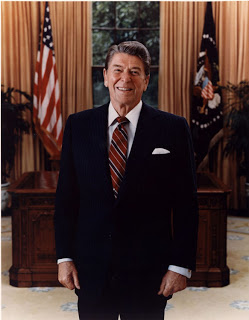
by Bret Capranica | Sep 4, 2013 | Presidential History
Over the past two weeks I’ve been reading through Richard Reeve’s, President Reagan. Reeve is an accomplished presidential biographer. While no friend to Reagan’s political philosophy, Reeve does paint a more objective picture than many of the former president’s detractors. Typically when I am reading a presidential biography I am mostly on the hunt for the habits that mark his leadership style. Here are a few I have marked in regard to his first term: From the Introduction Reagan had the virtues and failings of an old man: He already knew what he wanted to know, he was set in his ways, stubborn, and he did not generally care what journalists or the hired help thought of him. He was not obsessed by history, as were Kennedy and Nixon (xiii). A note Reeves marked in Calvin Coolidge’s autobiography that Reagan read while in the White House: “In the discharge of the duties of the office there is one rule of action more important than all others. It consists in never doing anything that some one else can do for you” (xiii). I do not subscribe to the many theories of Reagan’s passivity. It is true that much of any presidency is essentially reactive, dealing with crises unpredictable and unanticipated-strikes, bombings, market crashes, revolutions, plagues – but the President Reagan I found in the course of my research was a gambler, a bold, determined guy (xiv). I do not think Reagan was an unwitting tool of a manipulative staff. Quite the opposite (xv). He knew how to be President. The job does not pay by the hour. Presidential naps don’t...
by Bret Capranica | May 7, 2012 | Bookreviews, Church History, Pastoral Ministry, Video
Purchase A Brief Account of the Life and Labors of George...
![Broadus on Boyce]()
by Bret Capranica | May 8, 2011 | Bookreviews, Pastoral Ministry, Southern Baptist Issues, Theological Education
Broadus On Boyce from Bret Capranica on Vimeo. A Gentleman and a Scholar: A Memoir of James Petigru Boyce, John A. Broadus John A. Broadus, an original faculty member, and the second President of The Southern Baptist Theological Seminary, writes a warm and thorough account of the life and ministry of his good friend, and the first President of Southern Seminary, James Petigru Boyce. Published in 1893, Broadus”™s biography is an excellent illustration of life in antebellum and post-Civil War America. The first third of the book is devoted to the early life and education of Boyce. It is an excellent review of the providential circumstances that prepared Boyce to be a scholar and one devoted to training others in biblical scholarship and pastoral ministry. The majority of the book, however, is devoted more to a history of the founding and early days of Southern Seminary, emphasizing Boyce”™s critical life investment. Boyce is pictured as an avid reader, intense in increasing his knowledge throughout his entire life. From boyhood to the end of his life, Broadus depicts Boyce”™s thirst to grow. He is also shown to be a icon of perseverance, as Broadus describes Boyce”™s unflagging commitment to start and sustain Southern Seminary despite the enormous set backs from the civil war which included divesting Boyce of much of his personal wealth. Even to his last days, Boyce was immersed in promoting and securing the seminary”™s future. It is a fascinating and convicting look into a life of focus, discipline, and perseverance. Broadus”™ book is also an excellent look into how Southern Baptists, like Boyce, functioned during the tumultuous...


